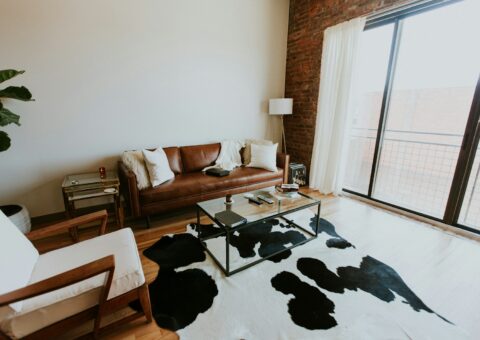Valeriia: Thank you so much for agreeing to have a call with me today and to participate in our ‘employee story of the month’ project. Actually, I am very excited to hear what you have got to share today. So maybe you would like to start with a brief introduction of yourself first?
Cherry: Sure. I am Chinese Australian. I moved to London in 2010. And I joined Homelike about in March 2020, so a week essentially England went into lockdown. And I would say it was definitely a really interesting start to my Homelike journey. It’s been great in the past, just nearly 2 years now since I joined, to see how Homelike has grown and just changed and evolved so much during my time here. And I’ve also recently returned from mat leave, so my son is 8 months now, but it’s been great to be back actually.

Valeriia: This is awesome. Good to know. Let’s get more into your role at Homelike. Can you tell me what the primary responsibilities of your position are?
Cherry: Yeah, sure. As a country manager for UK and Ireland, and the UK is our second biggest market, my primary responsibilities include managing our PNL for both the markets, overseeing everything supply-related within the two markets, so that includes supply acquisition, business development, operations, and sales as well as PR.
There is quite a bit of collaboration going on between the product, marketing, and tech teams on a weekly, if not monthly basis. One of the other things I support is both driving and leading central strategic projects. One of the projects that I am overseeing right now within the supply team is trying to understand churn across our properties. And last but not least is.. you know a part of my day-to-day role involves some fire fighting as well – any topics that come up.
Valeriia: Yeah alright. So what would you say is your leadership style here? How do you normally go about making decisions? Especially in such a fast-paced environment at Homelike and with all the different tasks, and departments that have cross-functional work that we have going on here.
Cherry: Yeah, that is a good question. When I reflect back and think about my leadership style, it’s evolved since the time that I joined Homelike. I think it will continue to evolve during my time at Homelike.
Right now I would say my leadership style is more around a coaching style. Thinking more about a sports coach and in that sense, it is more like insuring that I am supporting my team by helping them build the right foundations, have the right techniques in play, identifying their strengths, and really playing to that as well when I can see that they have strengths, that fills some of my weaknesses as well, and also supporting them on how to improve some of their improvement areas, and also kind of listening, being a good communicator, and really allowing people to shine, and putting them into the spotlight, letting them do their thing and really seeing them grow.
And included in that as well is developing and having a good feedback and learning loop, not just for my team, but also for myself as well. Because I think it is nice to support people, but also understand how I can develop as well to be a better coach for my team.
And then when it comes to decision making, I would say that I take quite a holistic approach in the sense that I use quite a data-driven approach, but I need to support that by having a structured process to it.
Prior to joining Homelike, I was working at BAIN. And one of the things I learned at BAIN is the importance of really using data, both qualitative and quantitative to support that decision-making process.
Valeriia: Alright alright I see. But do you still have moments when you look back and you wish you had done it differently?
Cherry: Yeah, of course. Humans are irrational, right? And as much as I would like to say that I have this data-driven approach to decision making. Sometimes that doesn’t always happen because sometimes your intuition or instincts might step into place, right? Sometimes you get it wrong, but what is more important is being able to learn from that and try not to make the same mistake again.
Valeriia: Absolutely. These are very good points. I can imagine it is very essential in developing a market and supporting the whole team. And I would say I have more of a broad question for you related to that. What would you say is the greatest challenge of expansion in the new city or a country in general? Or if I get a little bit more specific, what has been the most significant barrier in the UK/I in particular?
Cherry: Yes, sure. I could speak about it for a long time. I guess from the supply side in the UK and also in Dublin as well, we have actually been growing quite a lot in cities outside of London, so Manchester, Cambridge, Edinburgh.
I would say the biggest challenge for us as a brand is ensuring that we actually have a strong brand presence as well to build that trust with our new suppliers and also with tenants as well because, in order to.. yeah you need to really build the supply base and then on the demand side, you need to build that trust with the tenants to ensure that we can kind of match the demand with our supply. So, I would say, that would be the biggest challenge in terms of expansion into new cities.
And then the biggest barriers for both UK and Ireland, I would say so for the other cities outside of London, but for London… Central London property prices and the rent are quite high. It is important for us to get the balance right and to also find appropriately priced supply to match that demand that we get. Because if we have suppliers who have very high-end properties on our platform, most of the time, they do not end up getting booked, just because their pricing is too high. I would not say it is a significant barrier but it is definitely a barrier when it comes to attracting the demand that we attract.
And in Dublin, a very similar story as well, but also it is also more of a macro trend that we see in Dublin. So, there is a rental crisis going on there and what that has meant is that supply is very constrained. As a result, rent is incredibly high. So, again similar to central London and just London in general, finding the appropriately priced supply to meet our demand, I would say that’s been a challenge.
But also the biggest barrier in Dublin is that there is more of a macro thing going on there and that is the rental crisis. I think in 2019 or 2020, they stopped permitting co-living developments and coliving is a sector that we are really investing heavily in as well, and we are kind of investing in partnering with coliving providers, and that has been a barrier to growing faster in Ireland, especially Dublin.

Valeriia: Alright I see. This is actually something new to me. So, very interesting, good to know! I guess once you go through all these challenges and barriers, it would be a rewarding experience once you manage to meet demand and supply.
I have actually seen also so many developments and shifts in the prop-tech industry in various markets. So, what is one of the biggest advances in your region over the past two years? What would you say? Have you seen any recent shifts in demand for mid-term/long-term apartment bookings?
Cherry: Yeah. I would say in general that trend, we are already seeing that trend, you see that a lot on the news as well, so definitely on the demand side, there is a growing demand for the midterm/long term bookings, and that has also been primarily driven by Covid as well.
So, just in terms of the type of tenants that we see booking on our platform, those tenants that booked directly, so we have also a B2B segment as well within Homelike, and also within the UK and Ireland team. But fewer corporate and relocation companies book directly with us – they tend to do it through our B2B teams.
We do see just in general on the consumer side, kind of less of those corporate and relocation bookings and more of this trend coming from digital nomad, so people who have the flexibility like Homelikees, we can work flexibly. We are a remote-based company, so Homelike is fully remote and we have the ability to work anywhere in the world for 2 months of the year.
At the same time, I think you are seeing a greater number, portion of these tenants traveling to different cities and booking stays for one or two months to work remotely from those cities and we definitely see that. What that has resulted in is an actual shorter average length of stay in the UK, so the average length of stay pre-pandemic was around 3 to 3,5 months, and now that is more around 2,5 to 3 months as well. And you also see that from the corporates who are traveling, they are staying for actually a longer period of time, so instead of 1 or 2 days, they might be staying for like a week, or a month or 2 months. So, that also kind of impacted the average length of stay. That’s actually been an interesting trend.
The other kind of shift that we see is from the investment point of view – an increased investment within the coliving / shared living space within the UK. You definitely see that just in terms of the demand there is for, from the tenant side as well.
And the last trend that we have seen is the increased instant booking share that we get on our platform. So, pre-covid, roughly 20% of our bookings were instant and now that is almost doubled since Covid came into the picture. I think that is also a change in consumer behavior. They feel a bit more comfortable booking these bigger basket sizes purely online without having to speak to someone directly. And I also think that is a reflection of the brand that we’ve built within the UK and Ireland to enable this to happen.
Valeriia: Yeah, I see your point. Absolutely. And how do you in general stay on top of trends in the industry? How do you normally keep track of everything across the UK/I region?
Cherry: It is a combination of networking, ensuring that you speak regularly to people in the industry, having close contacts in the industry as well as staying on top of certain news channels as well. And also then more broadly just looking at different trends, whether it is in the prop-tech, in the residential / lettings area of UK and Ireland.
So, I would say it is a combination of like networking and also you know reading lots of different kinds of news articles from various sources. That is how I stay on top of the trends. And obviously my team, they are such a great source of information, especially my supply team.
On top of that, I think one of the great things within Homelike, even though we are fully remote, is the leadership team has.. especially within the leadership team and across Homelike as an organization, I think over the course of.. since the time I have been here, there is so much more open communication and collaboration. And Slack has been a great channel for that and also our Demo Days, and that is also helped in kind of getting greater transparency on some of the trends happening in other markets as well because that is definitely valuable for me and also my team and everyone within the organization just to understand the different trends happening in the different markets and how that has an impact on us as an organization.
Valeriia: Exactly. That is for sure. I think because of this constant communication, transparency, Demo Days, all this brings all the challenges, all the trends from different markets, different points of view, so definitely helps a lot more I guess every single team.
I think I could probably still ask you questions for the next hour, there are a ton of things we could discuss. I have learned a great deal. It´s been great. Thank you again for your time and for joining me today.
Mio: I have a lot of support from the other UX designer and just the team in general. I think I really appreciate that they trust my skill and capabilities and kind of give me also the freedom to like explore different ideas and voice my opinions, how we should do things, and propose new ideas. I really liked this open communication with the teams. So, yeah. Yeah, it’s been really good.
Valeriia: Support and open communications. These are the key aspects for sure. Yeah. Lovely. All right.
I mean, we had a great chat today. I would love to do it again sometime next year.
Cherry: Thank you! No, absolutely, my pleasure!
Join the Homelike team...
Open Application – German speakers (f/m/d)
Full-time, Athens, Barcelona, Cologne, London,
























